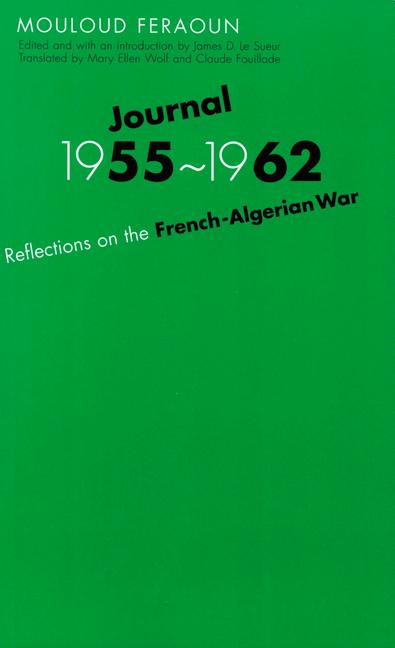
Zustellung: Di, 29.07. - Sa, 02.08.
Versand in 2 Wochen
VersandkostenfreiMouloud Feraoun was assassinated by a right wing French terrorist group, the Organisation Armee Secrete, just three days before the official cease-fire ended Algeria's eight-year battle for independence from France. However, not even the gunmen of the OAS could prevent Feraoun's journal from being published. Journal, 1955-1962 appeared posthumously in French in 1962 and remains the single most important account of everyday life in Algeria during decolonization.Feraoun was one of Algeria's leading writers. He was a friend of Albert Camus, Emmanuel Robles, Pierre Bourdieu, and other French and North African intellectuals. A committed teacher, he had dedicated his life to preparing Algeria's youth for a better future. As a Muslim and Kabyle writer, his reflections on the war in Algeria afford penetrating insights into the nuances of Algerian nationalism, as well as into complex aspects of intellectual, colonial, and national identity. Feraoun's Journal captures the heartbreak of a writer profoundly aware of the social and political turmoil of the time. This classic account, now available in English, should be read by anyone interested in the history of European colonialism and the tragedies of contemporary Algeria.
Produktdetails
Erscheinungsdatum
01. Juni 2000
Sprache
englisch
Seitenanzahl
340
Autor/Autorin
Mouloud Feraoun
Herausgegeben von
James D Le Sueur
Übersetzung
Claude Fouillade, Mary Ellen Wolf
Verlag/Hersteller
Produktart
kartoniert
Gewicht
435 g
Größe (L/B/H)
215/135/21 mm
ISBN
9780803269033
Pressestimmen
"[Feraoun's] journal brings a unique perspective to what was perhaps the most brutal of the anticolonial wars. This is not a chronicle of war itself: rather, it is an intensely personal memoir detailing how the savage conflict affected the daily lives of people on both sides of the divide. Feraoun is clearly sympathetic to the rebel cause, but he is no mere shill for their side. He passionately examines the human condition with all its flaws and nobility, yet he occasionally describes events with an eerie detachment. Since he was assassinated by a French terrorist group just three days before the cease-fire that ended the war, his account is especially poignant. An emotionally draining and important work."--Booklist, July 2000"Mouloud Feraoun was an admirable man and this is a worthy book."--Morning Star, 16 October 2000 As a chronicle of what the break meant when it was taking place on the village streets and in the countryside, in the homes of the people most directly affected by its endless cruelty, the journal that Feraoun kept, at the urging of his friend Robles, somewhat irregularly, from 1955 until 1961, is indispensable. It is also entirely without philosophical affectation, a profound and concrete commentary on issues that would arise again in the 'north-south' crises in the following decades, of which the Algerian revolution was, one might say, the laboratory. After years of anti-colonial and post-colonial theory, Feraoun's journal is truly refreshing to read. In its pages a genuinely free man reflects on relations of power between the conqueror and the conquered, on the place of intellectuals and teachers in a political war, on the effect of repression and resistance on families and neighbors, friends and communities. The simplicity with which Feraoun approached these terrible events was a literary strategy, a literary accomplishment---and proof that he had a better grasp of the meaning of his country's history than did most commentators in Paris and elsewhere. Keeping his journal, moreover, was an act of courage: people where arrested and killed for less overt expressions of sympathy for the rebellion..." "They both (Feraoun and Camus) learned French with the simplicity and the clarity that characterize that language's best prose: they are the kinds of writers who seem, when you first encounter them, easy to read, and turn out to be far more difficult to understand. They always say much more than you thought they said. This is, of course, one definition of classical literature; and both Camus, who won the Nobel Prize for Literature in 1957, and Feraoun, who is probably the most widely-read French-language Algerian writer of the century (after Camus), were part of the French canon by the late 1950s..." "Tersely and eloquently, Feraoun summed up in the pages of his journal the injustice of the colonial system, but unlike the Paris intellectuals he did not dwell upon it, preferring to keep notes on what actually happened to actual people with whom he was acquainted..." "Feraoun's journal became one of the most important books to emerge from the Algerian conflict. It is an essential human document, a real war book... The Algerian war... remains an unavoidable reference point in the debate over the kind of world we will live in. And this debate was foreshadowed in Feraoun's journal, as in the polemical writings of Camus and Amrouche. For this reason, the publication of this English translation of Feraoun's Journal is very welcome..." The New Republic
Bewertungen
0 Bewertungen
Es wurden noch keine Bewertungen abgegeben. Schreiben Sie die erste Bewertung zu "Journal, 1955-1962" und helfen Sie damit anderen bei der Kaufentscheidung.








